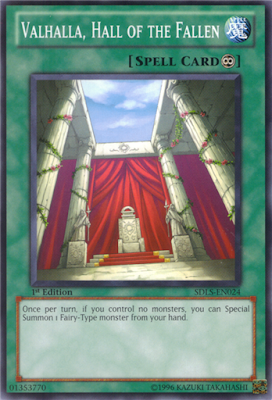Valhalla, Hall Of The Fallen Yu-Gi-Oh! Card Game Trivia
Posted by
Freya Yuki
Monday, November 25, 2013
at
11:35 PM

Valhalla, Hall Of The Fallen is one of the many cards in the Yu-Gi-Oh! card game. But just what is so interesting about this card? What does it mean and what could it be referencing?
For a card with such a long name, the text content on it is pretty sparce, consisting of only one sentence that barely takes 2 lines.
Valhalla, Hall Of The Fallen is a useful Spell Card, particularly for those that have Fairy-Type monsters in their deck or those that make use of a Fairy deck.
But where did the name of this card come from anyway? What does Valhalla mean? Valhalla is actually from Norse Mytholog, and, just like the Yu-Gi-Oh! card named after it, it isn't the name of a person, but the name of a place.
To be more precise, Valhalla is the name of a hall in Norse Mythology and it means "hall of the slain," which explains why the Yu-Gi-Oh! card in question has such a long but appropriate name. In Norse Mythology, Valhalla is located in Asgard, which is the realm of the Norse gods and goddesses.
The king of the gods, Odin, is the one who presides or rules over this hall. With the fact that Valhalla is located in the realm of the gods themselves and with how it is said to be grand, great and majestic, it's no wonder that the the illustration of the image on the Yu-Gi-Oh! card appears to reflect this.
So, what is the reason why Valhalla would be termed as the hall of the slain or the hall of the fallen? This is because the inhabitants of Valhalla are actually all warriors and heroes. But, while these are all people who died due to fighting or during combat, that is not the only criteria in order for one to get to Valhalla.
What is actually important is how strong and powerful these people are especially in terms of their fighting prowess and capabilities. Women known as the Valkyries from Asgard are the ones that have been tasked to select the best warriors and heroes, and, upon the death of these people, the Valkyries themselves will lead them to Valhalla.
This can explain why the effect of this Yu-Gi-Oh! card enables you to Special Summon a monster.
Special Summoning gives you the opportunity to get monsters with high attack and high level on the field without having to sacrifice other monsters in order to do so.
By taking advantage of Valhalla, Hall Of The Fallen's effect, you can summon powerful monsters to help you defeat your opponent in much the same way that the beings in Norse Mythology's Valhalla are also all powerful and strong.
But what is Valhalla (the one in Norse Mythology) for anyway? Why are heroes and warriors being brought there? The reason is that these people will fight and die (yet again) when Ragnarok, the end of the world or the twilight of the gods, comes.
However, until the end arrives, they are free to just lounge around and have fun. Of course, it is necessary to keep in shape in order to be prepared for Ragnarok.
This is why all the warriors and heroes in Valhalla engage in combat each and every single day.
They fight with each other without a care for how many injuries they sustain or how bad their wounds might be because, at the end of the day, any and all wounds are healed and they are once again ready to fight all over again the very next day.
This can explain the limitation in Valhalla, Hall Of The Fallen, which only allows you to Special Summon a monster (and not just any monster but a Fairy-Type one) if you control no other monsters and only once per turn.
What do you think of this Yu-Gi-Oh! card? Do you use Valhalla, Hall Of The Fallen in one or some of your decks?
*Notes:
- Image with added text was modified by Freya Yuki based on the image by Eccentric Scholar (CC:BY) from flickr
- Said image is meant to symbolize Valhalla
- The rest of the pics are enlarged product images from Amazon.com; links shown above via Amazon's Native Shopping Ads widget
For a card with such a long name, the text content on it is pretty sparce, consisting of only one sentence that barely takes 2 lines.
Valhalla, Hall Of The Fallen is a useful Spell Card, particularly for those that have Fairy-Type monsters in their deck or those that make use of a Fairy deck.
But where did the name of this card come from anyway? What does Valhalla mean? Valhalla is actually from Norse Mytholog, and, just like the Yu-Gi-Oh! card named after it, it isn't the name of a person, but the name of a place.
To be more precise, Valhalla is the name of a hall in Norse Mythology and it means "hall of the slain," which explains why the Yu-Gi-Oh! card in question has such a long but appropriate name. In Norse Mythology, Valhalla is located in Asgard, which is the realm of the Norse gods and goddesses.
The king of the gods, Odin, is the one who presides or rules over this hall. With the fact that Valhalla is located in the realm of the gods themselves and with how it is said to be grand, great and majestic, it's no wonder that the the illustration of the image on the Yu-Gi-Oh! card appears to reflect this.
So, what is the reason why Valhalla would be termed as the hall of the slain or the hall of the fallen? This is because the inhabitants of Valhalla are actually all warriors and heroes. But, while these are all people who died due to fighting or during combat, that is not the only criteria in order for one to get to Valhalla.
What is actually important is how strong and powerful these people are especially in terms of their fighting prowess and capabilities. Women known as the Valkyries from Asgard are the ones that have been tasked to select the best warriors and heroes, and, upon the death of these people, the Valkyries themselves will lead them to Valhalla.
This can explain why the effect of this Yu-Gi-Oh! card enables you to Special Summon a monster.
Special Summoning gives you the opportunity to get monsters with high attack and high level on the field without having to sacrifice other monsters in order to do so.
By taking advantage of Valhalla, Hall Of The Fallen's effect, you can summon powerful monsters to help you defeat your opponent in much the same way that the beings in Norse Mythology's Valhalla are also all powerful and strong.
But what is Valhalla (the one in Norse Mythology) for anyway? Why are heroes and warriors being brought there? The reason is that these people will fight and die (yet again) when Ragnarok, the end of the world or the twilight of the gods, comes.
However, until the end arrives, they are free to just lounge around and have fun. Of course, it is necessary to keep in shape in order to be prepared for Ragnarok.
This is why all the warriors and heroes in Valhalla engage in combat each and every single day.
They fight with each other without a care for how many injuries they sustain or how bad their wounds might be because, at the end of the day, any and all wounds are healed and they are once again ready to fight all over again the very next day.
This can explain the limitation in Valhalla, Hall Of The Fallen, which only allows you to Special Summon a monster (and not just any monster but a Fairy-Type one) if you control no other monsters and only once per turn.
What do you think of this Yu-Gi-Oh! card? Do you use Valhalla, Hall Of The Fallen in one or some of your decks?
*Notes:
- Image with added text was modified by Freya Yuki based on the image by Eccentric Scholar (CC:BY) from flickr
- Said image is meant to symbolize Valhalla
- The rest of the pics are enlarged product images from Amazon.com; links shown above via Amazon's Native Shopping Ads widget

Freya Yuki has been an anime fan for years. She loves watching anime, reading manga, and writing about it in a thought-provoking way. For more information, check out the Author page on her main Google Blogger blog, the About page on her main Tumblr blog and the About page on this blog. Have questions? Need some help? Want to hire Freya? You can contact/get in touch with her here.
Share your thoughts and opinions by commenting below:
To comment as a guest or anonymously: Select the discussion then the name textbox. Put a check on the "I'd rather post as guest" checkbox and you can submit your comment without logging in or creating an account.
By leaving a comment, you agree with the comment guidelines.











